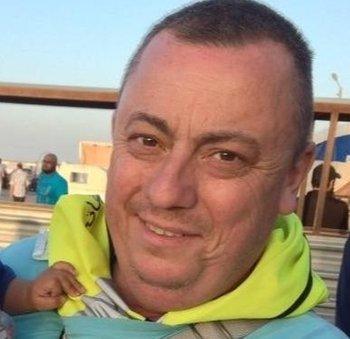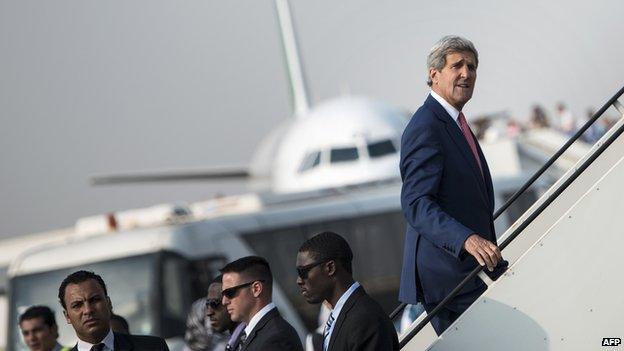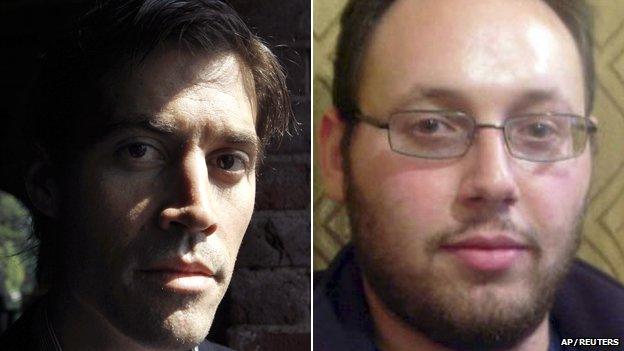David Haines: PM says Britain will 'hunt down' IS killers
- Published
David Cameron: "They are not Muslims, they are monsters"
The UK will take "whatever steps are necessary" to keep safe after a video showing the killing of hostage David Haines was issued by Islamic State militants, the prime minister has said.
David Cameron said the UK would "hunt down" the killers of the aid worker, whom he called a "British hero".
He said the "menace" of IS had to be destroyed in a "calm, deliberate" way.
In the video, IS also threatened to kill a second Briton, who has been named as Alan Henning, 47.
Mr Henning, a married father-of-two from Salford, worked as a taxi driver and was a volunteer on an aid convoy.
'Despicable killing'
Speaking at Downing Street after a meeting of the UK emergency committee Cobra, Mr Cameron said of IS, also known as Isil and Isis, "they are not Muslims, they are monsters".

IS has now threatened to kill another hostage, Alan Henning
"We will do everything in our power to hunt down these murderers and ensure they face justice, however long it takes."
In the video, a masked man who appears to have a British accent was pictured beside Mr Haines holding a knife.
Mr Cameron said the country was "sickened" that a Briton could have carried out the "despicable" killing.
"We cannot just walk on by if we are to keep this country safe," he said.
"Step by step, we must drive back, dismantle and ultimately destroy Isil and what it stands for.
"We will not do so on our own, but with working with our allies, not just in the United States and in Europe, but also in the region."
He said the organisation posed a "massive threat" to the entire Middle East and said it would be defeated through a "comprehensive and sustained counter-terrorism strategy".
He added: "This is not about British combat troops on the ground. It is about working with others to extinguish this terrorist threat."
US officials later said several Arab countries had offered to take part in air strikes against IS militants in Iraq - subject to approval from the Iraqi government.
US Secretary of State John Kerry - speaking in Paris after a whirlwind tour of the Middle East trying to drum up support for action against IS - said he was "extremely encouraged" by such promises.

'Incredibly kind man'
The BBC's Catrin Nye describes meeting Alan Henning ahead of one of his aid trips
By Catrin Nye, BBC Asian Network
I met Alan Henning - before he was kidnapped - when he was packing up for an aid convoy in Syria.
At this point, he had already travelled to Syria on one convoy.
He described the fact that he had been before, he had visited a refugee camp, and had a really quite life-changing experience
It had really touched him and he said ever since he had got back things hadn't quite been the same and he felt a real desire to go again and to help the Syrian people.
Those who knew and met Alan describe him as a funny and incredibly kind man.
Just an ordinary bloke - a father, a taxi driver and a keen fisherman who wanted to help the Syrians.

During his statement, Mr Cameron outlined steps that Britain would take against IS:
Work with the Iraqi government to ensure it represents all of its people, and support the Kurdish regional government which has already received British ammunition and training
Work at the United Nations to mobilise the broadest possible support to "bear down" on IS
Support the United States in its direct military action, which is currently air strikes
Continue to use the RAF to supply humanitarian aid to the millions who have fled IS
Maintain and continue to reinforce the UK's counter-terrorist effort
He also said IS extremists "have planned, and continue to plan, attacks across Europe and in our country", adding that it would take time to "eradicate a threat like this" and would require action at home and abroad.
"It falls to the government and to each and every one of us to drain this poison from our society and to take on this warped ideology that is radicalising some of our young people," he said.
Mr Cameron has previously not ruled out air strikes against IS but said any action must not be "Western intervention over the heads of neighbouring states".

John Kerry has been travelling the Middle East to build support for a military alliance to counter the IS threat
BBC security correspondent Frank Gardner says several British prime ministers have pledged to bring the killers of a British hostage to justice whenever they are murdered in "cold blood" by jihadists.
But the reality is that historically the trail tends to go cold very soon afterwards, he added.
Mr Haines was seized in Syria in 2013. He was being held by Islamic State militants who had already killed two US captives, and a video of his death came shortly after his family appealed to his captors to make contact with them.
David Haines was being held by Islamic State militants, as Caroline Hawley reports
Born in Holderness, East Yorkshire, Mr Haines went to school in Perth and had been living in Croatia with his second wife, who is Croatian, and their four-year-old daughter. His parents live in Ayr.
The video of the 44-year-old's beheading was released on Saturday night.

Analysis
Frank Gardner, BBC security correspondent
Strip away the ghoulish theatre of this latest beheading video from the so-called Islamic State and one thing emerges very clearly.
The jihadists of IS are angry and frustrated that their earlier blitzkrieg advance across Iraq has been stopped in its tracks, and even reversed in places, thanks to US air strikes and arms supplies rushed to the Kurds.
Incapable to date of shooting down America's F/A18 jets, this is the group's way of hitting back at a distant enemy through the medium of public information.
David Cameron, to whom much of the video is addressed, has had 3 choices: 1) back away from confronting IS, which he has ruled out, 2) continue as before, giving arms, ammunition and training to the Kurds to fight IS, and 3) step up the UK role, which now looks inevitable.

Mr Haines' brother, Mike, who paid tribute to his brother after the death was confirmed, later made a further statement.
Mike Haines: "My first reaction could have been hatred...my brother's life wasn't about hatred"
He said: " We agree with the government in that Isil are extremely dangerous and pose a threat to every nation, every religion, every politics, every person," he said. "We need as a society to look and how we deal with this problem."
Byron Pacula, of Mr Haines's employers the Agency for Technical Cooperation and Development (Acted), said: "Acted is deeply appalled and horrified by the assassination of David Haines.
"We strongly condemn with the utmost of force those crimes that have happened against David."
The charity said the killing raised questions about how it could continue its work.
US President Barack Obama was among the world leaders to react to the killing of Mr Haines.

James Foley and Steven Sotloff were killed in the two previous IS videos
He said: "Our hearts go out to the family of Mr Haines and to the people of the United Kingdom."
Mr Obama said the US would work with the UK and a "broad coalition of nations" to "bring the perpetrators of this outrageous act to justice".
Militants from IS have killed two US hostages in recent weeks, posting videos on the internet.
They had threatened to kill Mr Haines during a video posted online showing the killing of US journalist Steven Sotloff earlier this month. They also released a video of the killing of US journalist James Foley last month.
The extremist group is now in control of large parts of northern Iraq and Syria and Kurdish forces, known as the Peshmerga, have been involved in heavy fighting with the militants.
US air strikes have targeted IS militants in Iraq in recent weeks.
The UK has donated heavy machine guns and ammunition to authorities in Iraq to help fight IS militants.